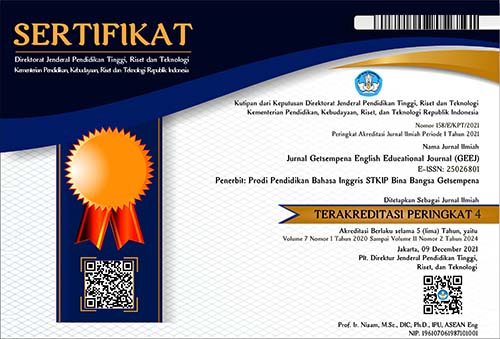TWO FACES OF ENGLISH HEGEMONY IN INDONESIA: AN OVERVIEW
Abstract
Mastering English which is currently an international language is one of the golden tickets to explore the world globally. As an educator, having an accredited research journal is an obligation. Nowadays, most international accredited journals are written in English. Therefore, having the ability of English language will help teachers to publish their articles or their writing internationally. Currently, almost all countries in the world prepare their human resources in English language skills. This paper argues that government policies, society, and English language teaching practices are students' environments which promote the emergence of bilingual euphoria phenomenon. Also, this paper will presents how this phenomenon will marginalize local languages together with some suggestions to overcome the situation.
References
Bali students fall short in Indonesian exam. (2011, May 5). Jakarta Post. Retrieved from www.thejakartapost.com/news/2011/05/16/bali-students-fall-short-indonesian-exam.html
Brown, H.D. &Abeywickrama, P. (2010). Language assessment: Principles and classroom practices. New York: Pearson Education, Inc.
Crystal, D. (2000). Language death. Cambridge: Cambridge University Press.
Djiwandono, P. I. (2005). Teach my children English: Why parents want English teaching for their children. E-Journal of Indonesian Journal of English Language Teaching ,1 (1), 62-72. Retrieved from www.indonesianjelt.org/com_download.php?file=pdf_5.pdf
Graddol, D. (2006). English next: Why global English may mean the end of ''English as a foreign language''.London: British Council..
Goodman, S., &Graddol, D., &Lilis, T. (eds) (2007). Redesigning English. New York: Routledge.
Graves, K. (2000). Designing language course: A guide for teachers. Boston: Heinle.
Maruli, A. (2010, April 25). NilaiUANterendah di SumutternyataBahasa Indonesia. Antara News. Retrieved from http://www.antaranews.com/berita/1272177636/nilai-un-terendah-di-sumut-ternyata-bahasa-indonesia
McKay, S. (2002). Teaching English as an international language: Rethinking goals and approach. Oxford: Oxford University Press.
Phillipson, R. (1992). Linguistic imperialsm. Oxford: Oxford University Press.
Sharifian, F. (Ed.).(2009). English as an international language: Perspectives and pedagogical issues. Canada: Multilingual matters.
PersenTak Lulus KarenaBahasa Indonesia. (2011, May 16). Kompas.com. Retrieved from http://edukasi.kompas.com/read/2011/05/16/13371277/70.Persen.Tak.Lulus.Karena.Bahasa.Indonesia

























